Pamphlet
Chuck Prophet covers a wide range of musical ground on his latest outing. In the opening tracks alone, we go from loud and dirty rock (“Automatic Blues”), to cross-generational Mind Games psych-pop (“Age of Miracles”), to the hip-hop inflected, hyper-melodic nod to the history of pop culture idioms (“You Did”) - which if it doesn’t answer, at least raises many more musical questions, including: “Who put the ram in the ram-a-lama ding-dong?…Who raised the roof and never made a sound?…Who cleared the static and made it sing? You did.” Prophet seems to have a fondness for throwing many different people and various sounds/styles/attitudes together just to see what happens. Dig the transformations throughout a cut like “Pin A Rose On Me.” The magic of such experimentation is no mistake; Prophet knows what he is doing. The results are enchanting, particularly the Spector of Wilson that drives a tune like “Just to See You Smile,” or the lilting groove of “You Got Me Where You Want Me.” I never did believe in miracles, and I’m beginning to wonder why.
February 28, 2007
New York Times
The back cover of his new album, “Soap and Water”, pictures Chuck Prophet in hipster-bohemian uniform (bedhead hairdo, canvas sneakers) haunting an empty laundromat. It’s a fitting image for his songs of poisoned love, in which every rake inevitably gets his lonely comeuppance - even Elvis Presley, who watches his female fans toss him their undergarments only to tell himself, “They’ll forget me when I’m gone.”
by
Sisario
on
February 10, 2007
The Village Voice
Smart-ass rocker crafts another #1 Record
Every aspiring guitarist who taped a copy of Big Star’s Radio City went on to start his own band. That’s conventional wisdom, but what about the misfits who scrounged a burn of Alex Chilton’s Like Flies on Sherbert or treasured a bootleg LP of his late-‘70s Elektra demos? On Soap and Water, former Green on Red guitarist Chuck Prophet answers that question. It’s a catchy, accurate recasting of Chilton’s terrified insouciance and sickening pop modulations, and if it occasionally descends into pastiche, it scrubs behind Chilton’s ears with a loving touch. Prophet might not sing as snidely as the Memphian did on such numbers as Sherbert’s “Hey! Little Child” (referenced here on “Heart Beat”), but he adds complaisant female vocals to an ingenious series of mocking guitar moves.
“Down Time” rocks along in the jaunty manner of the Sir Douglas Quintet’s “She’s About a Mover” and fades before it has time to gather momentum. Intelligent enough to take pleasure in the basics but too impatient to stick with anything for very long, Prophet sounds like the kind of smart-ass who doesn’t worry about earning your respect. This means he gets away with lines like “The women threw their panties/And the women threw their bras/Elvis hung his head/And said, ‘They’ll forget me when I’m gone.’ ” He affects wisdom on “Small Town,” a gorgeous meditation on big-city temptations-specifically, Prophet doesn’t want anyone to mess with his sister, who leaves town with only “a Realistic stereo and a phone that doesn’t ring” for evidence. Best of all is the title track, a two-chord stomp that finds Prophet trafficking in the cheap oppositions big brother Alex perfected 30 years ago. “Dry hump/Wet nurse/Loose change/Tight purse,” he sings, sounding like a man who wears clean underwear but is scared to change his dirty socks.
by
Edd Hurt
on
February 9, 2007
Winston-Salem Journal
Singer and songwriter Chuck Prophet has been ahead of the curve since his days with the devilishly cagey Green On Red. His latest solo album, the delightful Soap and Water, is another dance away from anything obvious, done so casually that he makes originality seem simple.
Prophet is the ultimate alternative hybridist. He uses rock ‘n’ roll as a foundation, tossing in tricks and treats snipped from all manner of musical genres. Smart arrangements play with cliches - orchestras, children’s choirs - yet somehow remain original, big and sweeping, embellishing the songs instead of overpowering them.
The heart of Soap and Water is Prophet’s skill as lyricist. He is a manipulator of metaphor and novelistic detail, a master at the art of making unease seem soothing through his congenial singing and wry, subtle sense of humor. Understatement has rarely been overstated so well.
by
Ed Bumgardner
on
January 11, 2007
DSD
Imagine if Jeff Tweedy had left Uncle Tupelo and gone on to form a band with Beck, instead of Wilco. That’s kind of what Chuck Prophet sounds like, and it’s really rather good.
Here we have twelve perfectly formed, unashamedly pop songs, ranging from all out alt-country through Blues licks that John Lee would be proud of to pulsating rock and roll, all infused with a sizeable dollop of soul. There are definite parallels with Odelay era Beck in particular, and with Wilco’s earlier material, but there’s plenty here that’s very much Chuck’s own as well.
The sound is fairly stripped back, although the addition of a choir on a few tracks adds a bit more meat. Mostly Chuck’s voice is backed by a mournfully wailing guitar and a funky drum beat, but it’s his voice that takes centre stage.
This album is really good. That’s all there is to it, really. It’s perfect music for sitting round with friends, maybe on the porch, maybe in the car. It’s got soul, and it’s got a lot of heart.
by
Will Slater
on
January 1, 2007
Mix
Chuck Prophet’s seventh album arrives after 12 years as a solo artist, peaking with his 2002 “adult alternative” single, “Summertime Thing.” This go ‘round promises to raise the San Franciscan’s profile even higher, as he raises the bar with a mix of blues (“Automatic Blues”), funk, psychedelic pop (“Age of Miracles”) and country rock.
Prophet’s signature drone tumbles out Lou Reed - ish poetic ramblings on “You Did (Bomp Shooby Dooby Bomp),” while wife Stephanie Finch lays down retro vintage keyboard parts. The combination is wistful, like someone mulling over the events of a long night in the city’s dark watering holes while riding a near-empty late-night bus home. Players hail from Nashville, San Francisco and points between, creating an album that’s crafted, modern and full of fine writing and melody, but not without its roots.
by
Heather Johnson
on
December 31, 2006
City Pages
These are a few of my favorite things about Chuck Prophet’s great new album:
1) It’s called Age of Miracles—despite all evidence to the contrary. 2) Prophet’s goofy vocal homage to Dylan on the bridge of the title track. 3) The outrageously sexy backup vocals of his wife Stephanie Finch. 4) The werewolflike howls that Prophet lets loose at the end of “West Memphis Moon.” 5) Despite being pigeonholed as an alt-country guy, Prophet lays down a soulful little rap at the end of “You’ve Got Me Where You Want Me.” 7) The cheesy glockenspiel flourishes and even cheesier backup vocals on “Just to See You Smile.” 8) And most of all, the final track, “Solid Gold,” a ridiculously schmaltzy and beautiful shout-out to friends and lovers.
by
Paul Demko
on
October 2, 2006
Blog Crits
Valley Fever - Green On Red Live at the Rialto
“Downwardly mobile ambitions” - that’s how writer Fred Mills described the music of Green On Red, the Southwestern band that became an underground sensation in Europe during the eighties. The band was among a handful of progenitors of the eclipsed “desert rock” sound, which blended elements of country with a frenetic, edgy guitar sound a la Neil Young.
Starting in 1980, the band released 11 albums, toured relentlessly, and experienced immense burnout throughout a 12-year career that included its share of lineup changes, business squabbles and drug/alcohol addiction. Singer, guitarist, songwriter Dan Stuart could be the poster child for musicians stuck between cult status and overblown celebrity.
Valley Fever is a serendipitous document of a one-off reunion of the group paying tribute to drummer Alex MacNicol, who died in 2004. Stuart and his mates Chris Cacavas (keyboards), Chuck Prophet (guitar), and Jack Waterson (bass) enlisted the help of some Brazilian tourists with video cameras to film the show. Surprisingly, the film work is first-rate. Instead of the standard shaky-cam shots that more often show the stage lights than the band, the turistas.com cameras capture extraordinary frames of the members that show grudging appreciation of each other and at other times facial expressions that indicate the opening of old wounds from being on stage again.
The focus is on Stuart, Prophet and Waterson as they jam with casual abandon while Cacavas and hired gun Daren Hess on drums are the subjects of two shots while they pound out some spiritually energizing rhythms throughout. As with any film, it’s the small details that really make the characters stand out, and Valley Fever has a number of moments that illuminate us into the group’s dynamic. Among the best are Stuart grabbing and mangling his lyric cheat sheets after each song, and foisting them gently into the audience, as if they were dry tumbleweeds being carried off by a dusty wind.
Musically, the band is brilliant. Green On Red was never known for theatrics or technical precision, instead plying a sloppy, self-deprecating style that heightened the bands’ status as rock anti-heroes. Anyone familiar with the band knows Stuart hates live performances, especially in theatres. Yet, his hatred of performance enhances the lazy attack of guitar chords that solidified his reputation in the first place. Prophet plays against Stuart’s minimalist approach with some shrapnel-spewing lead work accompanied by Waterson’s lively bass. This mélange supporting Stuart’s lachrymose words leads to an exalted concert experience.
While Mills was spot-on about Green On Red’s “downwardly mobile ambitions”, Valley Fever proves why the group surpassed its own expectations on a path littered with eighties bands that never found their potential. While the Rialto concert is a fitting tribute to a fallen comrade, Valley Fever is homage to what Green On Red might have been.
by
Larry Sakin
on
August 23, 2006
offthepage
Green on Red - Gas Food Lodging
Green on Red’s Gas Food Lodging was a high point for the band, a lasting document of 80’s post-punk rock, and a precursor to the alt-country movement of the 90s. That’s quite a bit of hyperbole, I know, but this record, first released in 1985, does have staying power. The addition of Chuck Prophet on guitar amped up and roughened up the band’s twang, but just as integral were core members Dan Stuart (vocals, guitar) and Chris Cacavas, whose organ gave the group its signature sound. As the title suggests, this is a road record, equal parts Kerouac and serial killer. It sounds, at times, like Crazy Horse, minus the freak-flag-fly romanticism of Neil Young. The record’s centerpiece is the three song raveup, “Sixteen Ways”/“The Drifter”/“Sea of Cortez,” which ends with Stuart’s primitive, anguished wail crashing against a wall of guitars, keys, and drums. As a bonus, the re-release includes the self titled, 7-track debut, which includes gems like “Hair and Skin.” Now it’s time for a double of Gravity Talks and No Free Lunch, the Mercury release currently available only as an import. Gas Food Lodging, along with records like The Days of Wine and Roses and Rum Sodomy and the Lash, will disabuse you of the notion that 80s rock totally sucked.
by
george pelecanos
on
April 30, 2006
Rockzilla
Chuck Prophet has come a long way from his “paisley underground” years as a lead guitarist for Green On Red with whom he recorded eight albums. Age of Miracles is his seventh solo effort and the musical territory Prophet explores here has, again, widened from the country/rock area he hailed from since his musical beginnings to soul, funk, hip-hop and industrial noise. Prophet as the producer of the album, the main guitar player and the singer and songwriter could not have put his signature down more clearly, but co-producer Eric Drew Feldman (Captain Beefheart, Frank Black, PJ Harvey) has certainly not just been another fiddler on the knobs. He helped to drag Prophet out of a creational and inspirational impasse and added some crucial sounds on his Moog synthesizer on a couple of tracks.
The general mood on Age of Miracles shows a certain gloomy likeness to Static Transmission, the 2003 album of another ex-paisley undergrounder, Steve Wynn (The Dream Syndicate). Both musicians have matured into independent, individualist musicians who almost never do what you expect them to do. With this release, Chuck Prophet continues the path he has chosen with The Hurting Business (2000) and No Other Love (2002), at the same time carefully trying to avoid repeating himself. The outcome is an album that is hard to fall in love with immediately, but that if you continue to play it nevertheless, suddenly seems to creep up behind you and hit you over the head with all its might and nastiness. This effect has a lot to do with the arrangement and the production that are “subliminally mean” rather than straightforward: something evil is hiding under the surface and you can’t smell it right away.
The same is true for the lyrics.
Sometimes I feel so alive/ I wish I was dead, Prophet growls in the opener “Automatic Blues” against a backdrop of blazing horns. There is something terrifying in the air, something that you feel listening to Iggy Pop’s The Idiot or Lou Reed’s Berlin.
Lou Reed’s presence is hovering throughout whole album including the title track, a sluggishly moving song with heavy string arrangement (Jason Borger) and female backing vocals (provided by Prophet’s wife Stephanie Finch):
The night is gonna crush the day
Once it was the other way
We hope that you enjoy your stay
In the age of miracles.
Prophet is accompanied on pedal steel in “The Smallest Man in the World” and it sounds good, but it’s a song with a weird lyrical twist underlined by Feldman’s piano playing that seems to quote from Newman’s “Little People” know what I mean? “Whatever he does, he’s the smallest man in the world” and that is not good news.
“Just to See You Smile” continues in the Lou Reed groove, but this time with an almost Phil Spector-like orchestration complete with booming bass, glockenspiel and a whole girl choir. Prophet immediately wipes the smile off any listener’s face with “West Memphis Moon,” the tragic story of the West Memphis Three, three young men who were convicted for murder of three boys in 1994, one of them sentenced to death, even though the evidence was, to say the least, questionable.
There’s a melancholy country feel about “You’ve Got Me Where you Want Me,” a duet with Stephanie Finch co-written by Kim Richey. Richey also contributed to “Baby Pin a Rose on Me,” which turns out to be about an abusive relationship:
You saw a light
I saw a freight train coming
I tried to tell you he was no damn good
You heard bells, I heard the hammer falling.
He ran you down like I said he would.
“A man’s strength is on the insidebut you better be careful with this stuff,” Prophet warns in “Heavy Duty,” a weird and frightening song (co-written with D. (Dan?) Penn), that sounds like Depeche Mode in their darkest period battling it out with Doug Sahm.
The closer “Solid Gold” (again featuring Stephanie Finch on vocals) is another song reminiscent of Lou Reed’s Berlin-period, with a very soulful, delicate string arrangement.
I wanna raise a toast to everyone
to my friends near and far
I wanna raise a toast to stand up men
Wherever you are
I wanna raise a toast to you my love
For putting up a fight
Then I’m gonna raise my glass again, for you and you alone
on this star- crossed night.
I drink to that. Not every song on Age of Miracles is equally convincing, but it is an album that will make you feel as if you have just been crushed by a truck. That’s not a feeling you want to have every day, but sometimes it helps to make you enjoy every day life a little bit more.
by
Marianne Ebertowski
on
January 1, 2006
Cityview Online
Postmodern Prophet
This is the age when modern miracles are born
Inventive. Eclectic. Chic. Chuck Prophet’s music, informed by the past and devised by the media age, is the soundtrack to a junk culture with a massive case of attention deficit disorder. It samples a variety of influences, including Hammond B3 soul, psychedelic rock, alt-country, melodic pop, old-school funk, dramatic blues and mild hip-hop, as it twists and turns into a sonic concoction that is as sardonic as it is adventurous.
But just because Prophet’s puree sound is a place where Dr. Dre and Charlie Feathers coexist, don’t assume he’s just another tawdry sampler or a Beck wannabe who goes out of his way to mix and mismatch odd combinations of sounds for the sole purpose of being a musical mad scientist. To do so would underestimate his visionary abilities and just how relevant and enjoyable such genre-twisting music can be when placed in deft hands. Prophet might be the perverse guy who invites all kinds of people to the same party because he likes them all and wants to see what will happen when they hang together, but by the end of the night he hopes they transcend any preconceived barriers.
“I like to kick songs around, pick ‘em apart and rotate the tires,” he says. “Sonically, I have fun with the songs and cast each one like it’s a movie. You cast it with a group of characters that complement one another and turn it sideways and bend it beyond recognition until you come up with something.”
Prophet’s reputation as a creative maverick began during the 1980s when he was the guitar slinger for the cosmic cowboy band Red on Green. He further endeared himself to critics and a loyal grassroots following with a string of solo albums he began making in 1990. However, his career and his art took a dramatic turn when he dropped his twangy guitar and began incorporating hip-hop and production techniques into his music at the turn of the century with “The Hurting Business.” Two years later, “No Other Love” spawned the top-5 radio hit “Summertime Thing,” which landed him the opening slot on Lucinda Williams’ summer tour and introduced his encyclopedic knowledge of popular music forms to fans across the country.
Since then, the San Francisco-based Prophet has added another gem to his growing body of work that is impossible to pigeonhole and ignore. The charismatic “Age of Miracles” is so void of gimmickry that it should serve as a guide to other artists on how to integrate synthesizers, beat boxes and programmers with drums, keys, bass and guitars in a hip, organic way.
“I’d like to think I’m getting better at what I’m doing,” Prophet says.
The title track, for example, is a ‘70s Bob Dylan country-rock tune with funky wah-wah guitar riffs, sweeping strings and a spacey chorus sung by Prophet’s wife, Stephanie Finch, that sounds like it was filtered through an early ‘80s Mattel video game. It stands in direct contrast to the album’s opening industrial ditty, “Automatic Blues,” not to mention “The Chronic”-style “You Did (Bomp Shooby Dooby Bomp),” which is loaded with Moog synths. And yet those tunes are worlds apart from the eerie tale of three slain civil rights activists on “West Memphis Moon” and the hypnotic “Monkey in the Middle,” brilliantly augmented by Rick Holstrom’s stinging blue guitar.
But while “Age of Miracles” spans Prophet’s sonic palette, he says thematically it shares a general crankiness with technology designed to make our lives easier.
“I’m not against technology,” he explains. “But I still stand in front of the microwave and say ‘hurry the fuck up.’”
Despite his disdain for today’s disposable society, Prophet still embraces it.
“It’s getting harder to make albums in the conventional way because in a sense they’re like novels, and when peoples’ attention spans shrink down to the time it takes to load their MP3 players, you have to learn how to dazzle them with a sonic event every four measures,” he says. “But when you lean in and do the work there’s all kinds of rewards.”
by
Michael Swanger
on
September 22, 2005
CityPaper.Net - Philadelphia
He made his first blip on the roots-rock radar as the guitarist with Green on Red, an early ‘90s alt-country band that fell apart just as the genre was gaining traction. Seven solo albums later, the California-bred singer-songwriter has become a bit of a critic’s darling; scoring the opening slot on Lucinda Williams’ tour last year certainly helped his cause. Like John Hiatt and Ron Sexsmith, Prophet’s one of those not-easy-to-categorize talents whose passion for sonic experimentation has him throwing all kinds of styles into the mix. His latest CD, Age of Miracles (New West), is grounded in the same country/folk soil as his other records, but with a distinctly quasi-psychedelic vibe. Here, Prophet melds literate pop-rock with country-roots realism, wah-wah guitars, blues riffs and sometimes sandpapery vocals. Wildly divergent, yes, but wonderfully so.
by
Nicole Pensiero
on
August 17, 2005
BetterPropaganda dot com
Chuck Prophet: No Other Love & Age Of Miracles
I’m such an asshole - read: “Music Purist” - that it’s not very often I get to put on a CD and find myself, happily, saying “Oh My God” over and over again (it’s usually an incredulous “Jeesus! These guys SUCK!” like I wasn’t already expecting it,...) but two Chuck Prophet albums, No Other Love and Age of Miracles , made just that alternate reality possible. Not only that: this asshole was getting a “hello” from a Major Fucking Artist - singing like fucking Tom Petty - and this asshole knew it.
Blues, Rock, Country, Pop, Ballads, Beats, Strings, Harps, Samples (“You mean, I can get my favorite little rainbow sprinkles, for only $2.79 a dozen?”) you name it - Chuck Prophet does it all. He strikes just the right balance, between tender and tough, and his production stays clean as a whistle - while he’s, continually, taking chances - from song to song, phrase to phrase, measure to measure, and note to note. It’s an amazing thing to behold. An artist in full bloom.
Of course, nobody’s perfect, and Mr. Prophet is no different. For a guy that, basically, sings love songs, he does, occasionally, wander into sonic areas he’s got no business (and can’t get out of, like on “You Did (Bomp Shooby Dooby Bomp” and “What Makes The Monkey Dance”) but, with such an accurate aim, he, probably, feels he can, naturally, go where he wants - and hopes you’ll just go with him - let him drive, y’know? You should. It’s an adventure, he’s a professional: he’ll get you back home, somehow.
“Storm Across The Sea” is probably the best example of what I like about this stuff (a guy, unpretentiously, telling us about his spitfire of a woman) it’s got such a mature sound - with echoes of Petty’s Heatbreakers, The Beatles, Gordon Lightfoot, Leonard Cohen, and dozens of other classic artists, wrapped up in it - but without copying any of ‘em. And he probably writes stuff like this in his sleep. I don’t know. But I’ll tell you what I do know:
If you’re a young Pop Musician, you better hope you’re good enough to write “Automatic Blues” when you grow up.
June 30, 2005
prefix mag
Once during a live performance, Ryan Adams regaled the audience with a Bob Dylan tour story, introducing the story’s original author, Chuck Prophet, as a “classic dude.” Take Mr. Adams as you like, but that description fits Prophet perfectly. Not only does it suit the man, whose wry humor comes through in even the straightest of songs, but it also is exemplified in Prophet’s seventh album, Age of Miracles, which even with its slick studio production manages to sound as classic as any classic rock. It’s flat-out good music, much of which will likely sound as good years from now as it does today.
Many have long felt that the former Green on Red member has been slighted by the listening public. A generally well-reviewed artist who has steadily produced albums since his 1990 solo debut, Brother Aldo, Prophet remains in relative obscurity, despite that his sound is relatively accessible. The irony is that his albums are getting progressively better. He includes some quirky elements, such as some unusual instruments and the occasional incorporation of hip-hop-sounding beats, but he manages to pull it off with out it sounding like a shtick.
With a Clapton-esque nasal vocal delivery, Prophet croons pure pop romance in “Just to See You Smile” and “You’ve Got Me Where You Want Me.” His quirky humor shines on the enigmatic character sketch in “Smallest Man in the World.” Showing his versatility, he turns to the more sinister narrative of “West Memphis Moon,” a dark, bluesy modern-day murder ballad. And he successfully explores the unrequited love a loyal friend and would-be lover in “Pin a Rose on Me”: “It’s the same old, sorry song and dance/ You’re always good for one more chance/ You saw a light, I saw a freight train comin’/ I tried to tell you he was no damn good.”
Though for someone with a reputation for guitar work, Prophet gives us little display of his prowess. He instead uses an unusual panoply of slickly layered instruments (Glockenspiel, frequently impressive pedal-steel guitar courtesy of Max Butler, harpsichord, Echoplex, and Moog), relying on electronic effects to carry his clever lyrics in this unassuming success.
by
Jacob Nelson
on
May 31, 2005
New Music review vol. 14
Chuck Prophet’s a no-nonsense songsmith. “You shouldn’t need an owners manual to get through an album” he declares. But don’t think the San Francisco-based singer/songwriter guitar hotshot is uncomplicated. The songs on Homemade blood resonate like strong memories, which is no slight accomplishment.
Prophet makes loud pop music that explores the quiet edges of Humanity. that’s where things turn weird and slowly begin to tilt or find their own skewed balance. His characters sleep in their cares: they burn with the pain of broken blood bonds: they can’t even get one even break. They’re repeatedly body-slammed by life, but won’t stop loving it anyway. Sure a few are psychos and losers, but many like the narrators of ‘Ooh Wee’ and ‘New Years Day’ - are romantics longing for happiness while settling for the nearest approximation.
“I spend time by myself, wresting on the ground with songs all day,” Prophet says of his modus operandi. “According to (deadbeat novelist) Charles Bukowski, you have to have faith, practice and luck to write. I try not to jerk too far away from any of those. And I try not to be elusive . That’s gutless”
Prophet learned to pack his songs with intestinal fortitude during seven years playing lead guitar and co-writing in the west coast 80’s psychedelic revival band Green On Red. So he rocks like crazy as he tells Homemade bloods ragged-luck stories. His battered Telecaster speaks the language of 90’s grunge with a 60’s acid drawl that makes the subteraneum homesick blues ‘Inside Track’ ring like Dylan fronting the Velvet Underground in Jon Spencer’s basement. His six string mannerisms, filigress along the lines of the dizzy pick-slides and sonic booms he tosses into ‘Credit’ put as much character into his numbers as his flexible baritone voice.
In keeping with Prophet’s’ truth-in music-policy, “we recorded the record as if it was a play, nobody went in the control room. Everything was cut live, standing up for the most part. That’s important to me. When you’re all in one room you’re involved. Art is divine, and that’s the kind of situation that gets it out of ourselves and closer to God if you will.”
March 31, 2005
New Zealand Herald
Prophet and Loss
“There’s winners and there’s losers and I’m caught between the two,” mourns Chuck Prophet in a rare self-pitying moment from Age of Miracles, his seventh and strongest album.
It is surprising that bitterness and regret don’t feature more prominently in the songs of this San Francisco-based singer-guitarist. With 20-plus road-years behind him – first as guitar-slinger with roots-punks Green on Red, for the past 14 under his own flag – Prophet is a qualified rock’n'roll veteran. And yet he has enjoyed neither the mainstream success his smart, tough songs and Tom Petty-crossed-with-Elvis looks should have earned him, nor the cult worship assigned to more naturally marginal figures like Will Oldham or Daniel Johnson.
But Age of Miracles finds him too engaged with the present to worry that he has never received his due. Though he remains a son of 60s rock, referencing everything from the drawl of Dylan’s Highway 61 to the orchestrations of the Beatles’ Abbey Road, he is also taking advantage of the same technology that allows hip-hoppers to create their contemporary cut-and-pastes.
Call it laptop rock. It’s a fusion that Prophet began exploring a couple of albums back. But if the turntables and sample-scapes of 1999’s The Hurting Business threatened to push Prophet’s meaty guitar right out of the frame, on Miracles he gets the balance just right.
On “You Did” he loops drums and weaves vocal samples into an electronic tapestry, without losing his grip on the fundamentally rock’n'roll question: “Who put the bomp in the bomp shooby dooby bomp?” And on the opening cut he stacks up the saxophones of Tom Waits’s erstwhile sideman Ralph Carney to re-inforce a crunching riff worthy of Exile-era Stones.
Prophet’s reconciling of digital technology with the rock’n'roll spirit is echoed in his website (http://www.chuckprophet.com), where he keeps an occasional log. Here, as he travels from one scungy gig to the next, he shares pearls of received wisdom (fellow journeyman Nikki Sudden cautions him, “I never drink coffee. Keith Richards told me that’s the absolute worst thing you can put in your body”), along with a droll commentary of his own. “I remember once getting bumped up to first class,” he muses as he boards yet another plane. “I didn’t want the flight to end … In first class you get the feeling that even if the plane crashes, first class will just keep going.”
And his songs are laced with the same droll humour. My favourite couplet on Age of Miracles: “I feel like a pair of sneakers in a washing machine/I’m bouncing off the walls, trapped in the heat.”
And yet if there’s a prevailing mood to Miracles, it’s one of gratitude – for small mercies, narrow escapes and, above all, good love. He lays out his theme in “Heavy Duty”, co-written with Dan Penn (composer of the ultimate ode to loyalty, the Aretha Franklin classic “Do Right Woman”) and again in the album’s closer, “Solid Gold”. In these songs, Prophet the rocker does not dissolve into sentimentality as a less mature artist might. He simply views his life from a perspective in which all the rocking and rolling is only made meaningful by the relationship that remains when the music’s over. In these moments you understand why there may be more important things to Chuck Prophet than winning or losing.
by
Nick Bollinger
on
February 3, 2005
Amazon.com
Rating: 4 out of 5 stars
A seasoned veteran that many are just now starting to hear about, singer/songwriter Chuck Prophet has just released his second album on New West and seventh overall. Prophet has a bluesy voice that is smooth and easy on the ears, and at its upper register resembles Ray Davies of the Kinks. There are flavors of blues, funk, rock, pop, alt-country, jazz…am I missing anything? Well, Prophet isn’t and he really shines here as an artist and a songwriter. The trippy “You Did” is my favorite track among a lot of good ones.
by
unknown
on
December 31, 2004
Pulse Twin Cities
Former member of alt-country godfathers Green On Red and musical experimenter deluxe Chuck Prophet’s second album for New West, Age Of Miracles, came out a year ago but is definitely worth a quick re-visit. Building on the hippety-hoppy, funked-out, rocked up, smoothed-down grooves of his last knock-out release, No Other Love, Prophet and “long-suffering wife/bandmate” Stephanie Finch (along with keyboardist Jason Borger, Red Meat alum/pedal steel whiz Max Butler, four bassists, five drummers, a beatbox and a programmer) gleefully continue to break all the rules here.
The lyrics at first seem deceptively simple-straight-forward love songs or story-songs or thematic current event songs or dark, cosmic-surfer songs-but upon closer listen, one finds Prophet to be among the rarest of song-writing talents: One who’s able to meld the sage observations of the omnipotent Outsider with the painful, all-too-human declarations of what he calls “... the smallest man in the world ...” to create tunes that let the listener both peer autonomously into fascinating tales and simultaneously experience the emotions of the subjects thereof.
He probably nails his own wonderfully twisted psyche and gloriously original oeuvre best in his own words: “All roads lead to Dylan I suppose, beyond that, if I mention one influence I’d have to leave out a hundred. One definite influence on this record is my increasingly acute awareness that we’re living in the modern age. Don’t get me wrong; I’m not about to throw my laptop into the river any day soon. I’d probably end up developing some kind of a tic without it. There’s just no time. No time to daydream, even less time to think. Fast food express lines, meth?paced TV, medications marketed to women who ‘have no time for yeast infections’ (as if the rest of us have the time). Genetically cloning the family pet, prescription miracle drugs, mad cows, madder scientists ... watch those carbs! The psychosis! On second thought, I wouldn’t have it any other way.” Neither would we, Chuck. Neither would we.
That’s it for this time ‘round, ‘Dial-heads! Tune in next week for a few more New West reviews, and don’t forget to kick Old Man Time in the ass for Tommy this New Year’s Eve ... Until next year-make yer own damn news.
by
Tom Hallett
on
December 27, 2004
Houston Press
Who put the bomp in the bomp shooby dooby bomp? / Who put the ram in the rama lama ding dong?
Listening to Chuck Prophet sing these lyrics, it’s not hard to believe that maybe Chuck himself did. Age of Miracles is the latest in a string of four incredibly strong albums since 1997’s Homemade Blood. But as satisfied as he is with the work, Prophet is in no mood for playing the artiste. “This one was tough, very tough,” he says. “I need to stop making a record every 18 months.” Even so, for all the stress and strain of a creative process that involves producing, writing and playing an orchestra’s worth of instruments, Prophet has managed another minor masterpiece, something purely American but entirely genre-blurring, something derivative yet far, far beyond simple derivation. The album is a huge vat of pop-music influences that may appear at any moment in tracks that are instantly catchy and always vaguely familiar, in a primordial-soup way. Besides his wicked Fender Squire fretwork and the nasty elasticity of his suggestive voice, Prophet lays on an array of sounds that range from garage-rock Farfisa organ to torrid night-of-sin horns.
The album is full of tunes co-written with some of the biggest names in the business, and nowhere is the collaborative effort more successful than on the dark, surly “Pin a Rose on Me” (Kim Richey), the Neil Sedaka-meets-the Ronnettes bouncy Brill Building love song “Just to See You Smile (Angelo, Kim Carnes) and the funk-laden “Heavy Duty” (Dan Penn). But the ultimate highlights are purely Prophet’s, like the rip-your-brain-out licks of “Automatic Blues,” the straight-from-the-Tenderloin lyrical slyness of “You Did” or the sinfully fun “Monkee in the Middle.” Fifteen years beyond his tour of duty in pioneering insurgent country outfit Green On Red, Chuck Prophet continues to put the hip in the hippie hippie shake.
by
Scott Faingold
on
December 15, 2004
Marquette Tribune
Best of 2004
Of all the artists on this list, perhaps there’s no one harder to pigeonhole than Chuck Prophet. On Age of Miracles, the under-acclaimed fretter builds upon his typically folk- and country-rooted sound with some curveballs. He begins, for example, with barroom scorcher “Automatic Blues,” then glides into 1970s psychedelic clouds with a smile-inducing title track that came 35 years too late to become a hippie anthem.
by
Dave Rossetti
on
December 8, 2004


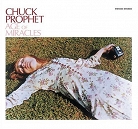
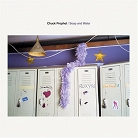
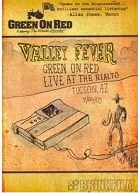
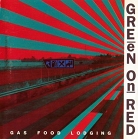






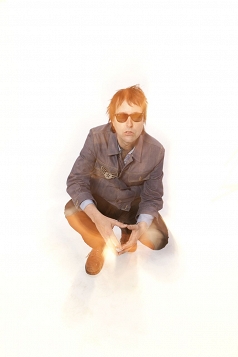


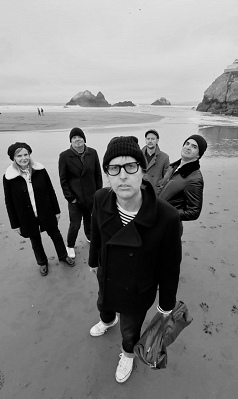

3_238_159auto_s_c1.jpeg)
